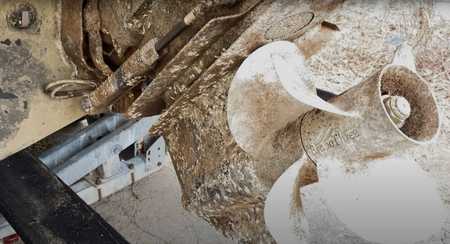The Importance of Replacing Anodes on Your Boat
- Home
- Blog
- Outboard motors
- The importance of replacing anodes on your boat
Anodes, also known as sacrificial anodes or galvanic anodes, play a critical role in protecting the metal parts of your boat from corrosion. These metal rods or plates are attached to your boat's hull, propeller, or other metal components, and are made of a more reactive metal than the metal parts they are protecting. When your boat is in the water, the anodes will corrode before the metal parts of your boat do, effectively sacrificing themselves to protect your boat from corrosion.

While anodes are designed to corrode over time, it is important to regularly inspect and replace them when necessary to ensure that they are able to effectively protect your boat. If the anodes on your boat are not functioning properly, the metal parts of your boat may start to corrode, which can cause serious damage and potentially result in costly repairs.
How often you need to replace the anodes on your boat depends on several factors, including the type of anodes you are using, the type of boat you have, the type of water you are operating in, and the amount of use your boat gets. In general, you should inspect your anodes at least once a year, and replace them when they are about 50% consumed. If you are using your boat frequently or operating in saltwater, you may need to replace the anodes more often. If you are using your boat infrequently or operating in freshwater, you may be able to go longer between replacements.
There are several types of anodes available, including aluminum, magnesium, and zinc. Each type of anode has its own advantages and disadvantages, and the best choice for your boat will depend on the specific needs of your vessel and the type of water you are operating in.
Aluminum anodes are the most common type of anode used on boats. They are relatively inexpensive and provide good corrosion protection in a variety of water conditions. However, they are not as effective as some other types of anodes in very high or very low pH environments.
Magnesium anodes are more reactive than aluminum anodes and are therefore more effective at protecting your boat from corrosion. They are often used in saltwater and are particularly effective in high pH environments. However, they are more expensive than aluminum anodes and may not be suitable for use in freshwater or in low pH environments.
Zinc anodes are another popular choice for boat owners. They are effective at protecting your boat from corrosion in a variety of water conditions, and are often used in freshwater as well as saltwater. Zinc anodes are more reactive than aluminum anodes, but not as reactive as magnesium anodes. They are also relatively inexpensive, making them a good choice for boat owners on a budget.
When it comes to replacing the anodes on your boat, it is important to use the correct size and type of anode for your vessel. Using the wrong size or type of anode can result in insufficient protection for your boat's metal parts and may even cause additional corrosion.
To replace the anodes on your boat, you will need a few tools and supplies:
- Anode wrench or socket set: An anode wrench or socket set is a specialized tool that is designed to remove and install anodes.
- Wire brush or sandpaper: A wire brush or sandpaper can be used to clean the surface of the metal parts to which the anodes will be attached.
- Screwdriver or drill: Depending on the mounting hardware used, you may need a screwdriver or drill to remove and install the anodes.
- Vice grips or pliers: Vice grips or pliers may be helpful in removing stubborn anodes.
- Protective gloves: It is a good idea to wear protective gloves when handling anodes, as the metal can be sharp and may contain hazardous substances.



